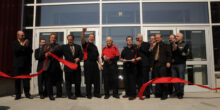U.S Senators announce RTP Full Funding Act of 2018
The Recreational Trails Program (RTP) has aided trail construction and maintenance projects and programs nationwide since 1991. Created through landmark surface transportation legislation, RTP reflected Congressional belief that federal gas taxes paid on motor fuel used in motorized non-highway recreational activities should be used to benefit those paying the tax as well as other users of recreational trails. Tens of millions of hikers and bikers, equestrians and ATVers, snowmobilers and skiers, canoeists and others now enjoy better outdoor experiences because of this action. RTP’s accomplishments unite the efforts in every state of federal agencies, state and local governments, volunteers and recreation businesses.
Now, the bipartisan efforts of four United States Senators promise to dramatically increase the benefits of RTP’s proven formula. U.S. Senators Amy Klobuchar (D-MN), Jim Risch (R-ID), Jeanne Shaheen (D-NH) and Richard Burr (R-NC) recently introduced S. 3604 – the RTP Full Funding Act of 2018 – to require a study to estimate the total amount of taxes collected on non-highway recreational fuel, improve reporting on expenditures from the RTP, and streamline RTP funding distribution to the states by reducing unnecessary paperwork.
“Minnesota snowmobilers, hikers, ATV users, cyclists, and countless others who enjoy the outdoors rely on the Recreational Trails Program to explore our state’s natural wonders and support our local businesses,” said Senator Klobuchar.“This bipartisan legislation will help ensure states receive all of the resources they deserve to protect and improve these trails for generations to come.”
“From our scenic trails and waterways to our mountains and canyons, outdoor recreation is a way of life in Idaho,” said Senator Risch. “In order to keep it that way, we have introduced legislation that will improve oversight and accountability of how our taxpayer dollars are spent on recreation management and infrastructure. Ensuring that recreational trails are properly cared for will help create strong economic opportunities and ensure future generations of Idahoans can continue to enjoy the natural beauty of our state and lands for many, many years to come.”
Over the last 27 years, the RTP has funded more than 23,000 projects. The program has attracted hundreds of millions of dollars of matching support from other private and public sources for trails and facilitated healthy outdoor recreation, as well as badly needed economic activity in countless communities.
“The Recreational Trails Program plays an important role in supporting New Hampshire’s outdoor recreation economy and tourism sector by investing in activities and trail projects across the state,” said Senator Shaheen. “As it expands, it’s critical that there be dedicated funding to sustain the program’s infrastructure and efforts, which help to ensure our environment, wildlife and beauty can be explored and appreciated by Granite Staters and visitors for years to come. I’m glad to support legislation that prioritizes funding for the Recreational Trails Program and I’ll keep working across the aisle on behalf of this important issue.”
Conservative estimates suggest that the RTP currently receives only about one third of the total taxes paid annually by non-highway “recreationists.” A study to determine the best available estimate of the total amount of non-highway recreational fuel taxes collected will help ensure that these federal taxes are appropriately returned to the states for RTP while helping provide the Congress with the information it needs as it considers future infrastructure legislation.
“I’m proud to co-sponsor S.3604, which will help to begin the process to ensure the Recreational Trails Program (RTP) is appropriately funded and effectively carrying out its mission of maintaining recreational trails of all varieties across the United States,” said Senator Burr.“One of our most important responsibilities is to preserve America’s great outdoors for our children and grandchildren, but too often commonsense conservation programs, like the RTP, are overlooked or underfunded. This bipartisan bill will help protect a key conservation program benefiting future generations.”








